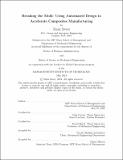Breaking the Mold: Using Automated Design to Accelerate Composites Manufacturing
Author(s)
Sweet, Mark
DownloadThesis PDF (9.005Mb)
Advisor
Carrier, John
Hardt, Dave
Terms of use
Metadata
Show full item recordAbstract
Re:Build Manufacturing’s member company, Composite Resources (CR), is a thermoset composites manufacturer primarily serving aerospace and defense customers. Composites manufacturing is an industry primarily differentiated on quality and lead times. Customers are innovative and value rapid prototyping capabilities. CR is challenged by the difficulty of finding experienced labor and a high-mix, low-volume workflow with frequent, non-recurring, low-value-added engineering work. In pursuing aggressive growth goals, CR must decouple revenue growth from headcount.
A significant component of lead time is the engineering design and toolpath generation for the molds used to manufacture the composite parts. This research seeks to automate mold design and toolpath generation, allowing CR to eliminate the labor bottleneck and establish short lead times as a competitive advantage.
This research studied existing manual mold design and toolpath generation processes to distill the key engineering decisions. A tiered system was developed to characterize parts suitable for automation. Algorithms were developed that automated mold design and toolpath generation for 12% of CR’s historical parts. Automation is projected to decrease engineering mold design times by 87% and overall lead times by 33% for in-scope parts.
Several areas for algorithm improvement are explored to increase the impact of design automation and further reduce lead times. Use cases for design automation are more broadly considered, and the implications for small manufacturers are explored.
Date issued
2024-05Department
Massachusetts Institute of Technology. Department of Mechanical Engineering; Sloan School of ManagementPublisher
Massachusetts Institute of Technology